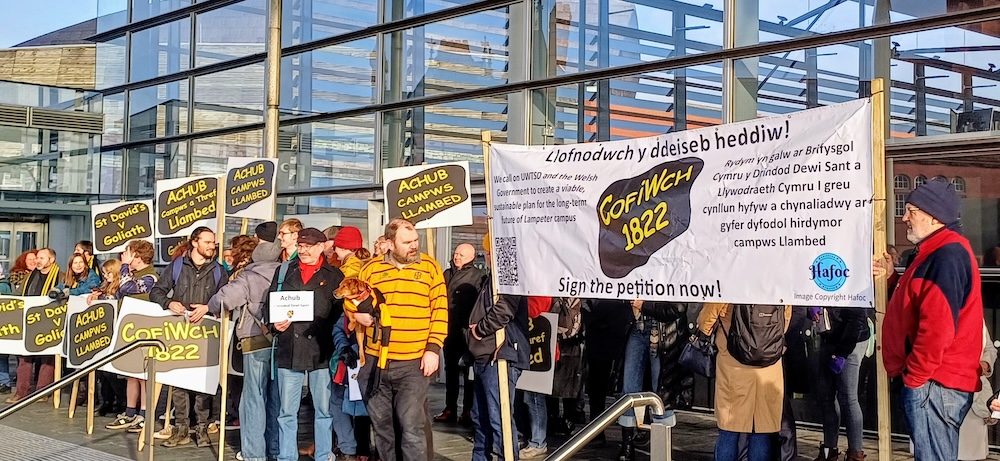Bethan Webber, CEO of Cwmpas, praises the contributions of the co-operative movement in Wales.
People in communities across Wales continue to face extreme challenges daily with continued uncertainty and the impacts of multiple events, from Brexit, the pandemic and cost of living crisis, to accelerating climate change. Wales needs a stronger, fairer and more sustainable economy. At Cwmpas, we believe that this can be achieved by doing business and services differently.
We recently celebrated Cooperatives Fortnight, which saw lots of discussion of the benefits of this model for communities. Wales has a long history of cooperative, social and democratic business models that put people and planet first, and by increasing their size and scale we can create the shift in our economy that’s needed to improve lives. The Welsh economy has had a strong co-operative current running through it for decades. From the workers at Tower Colliery to the vibrant co-operative sector in our communities today, Wales has led the way across different parts of the economy. Co-operatives are innovating in areas as diverse as the development of the credit union movement, the growth of the community-owned energy sector, social care, housing and the green economy. As we look at the pressures on budgets and public services and consider the experiences of those using them, these models of delivery have the potential to transform services with clear benefits to people and communities.
At the heart of the model is co-operation over competition and an innovative, entrepreneurial approach to finding solutions to the complex social and economic challenges we face today. Research by Co-operatives UK shows that co-operatives are ambitious and effective businesses that are more resilient. Giving local people a stake in the business they work in leads to higher levels of engagement, high productivity, and enables the sharing of profits and decision-making. The democratic element is a crucial part of community wealth building, empowering people to have a real say in how their village, town or city develops. At a time of significant anxiety about the future of our environment and our communities, the impact of this model cannot be underestimated.
A great example of this is The Timber Cooperative, an employee-owned business based in Caernarfon, specialising in producing and processing high-quality, locally sourced timber. They are a collective of woodland & woodworking enthusiasts, passionate about enabling their local communities to affordably undertake building projects in an environmentally-conscious manner. They are a great example of the type of worker-owned co-operative that is flourishing – contributing to a sustainable economy and creating value for workers and the wider community.
At Cwmpas, we have been passionately promoting the co-operative economy for over 40 years, and we’re ambitious to build on the progress made to make Wales the best place in the world to start, work in, and be a member of a co-operative. We work with partners to provide advice and support to those establishing cooperatives in Wales, in addition to working to ensure the right conditions in Wales to enable the sector to grow and flourish.
Through Social Business Wales, we work in partnership to provide specialist support to people looking to start and grow social enterprises in Wales, including co-operative and community-led business models. As part of this programme we deliver Employee Ownership Wales, supporting business owners to transition successfully to the employee-owned model. In 2020, as part of the Social Enterprise Stakeholder Group, we worked with partners to develop a 10 Year Vision and Action Plan that aims to make social business the business model of choice by 2030.
Robust debate and agenda-setting research.
Support Wales’ leading independent think tank.
We were pleased to see a commitment to doubling the size of the co-operative and mutual sector in the UK Labour manifesto, as well as Plaid Cymru’s commitment to promoting co-operative, employee and community ownership models. We are proud to have doubled the number of employee-owned businesses in just three years but it’s clear that there is potential to really build on this momentum and be more ambitious as we look ahead.
To realise our ambitions for the growth of the sector, we need proactive engagement with communities to raise awareness and promote the benefits of the co-operative model. From solving the challenges in social care to protecting Welsh language communities, legislation and government policy in Wales specifically supports the development of co-operatives and community-led models. To deliver the shift required we need specialists embedded in communities to connect people with opportunities and provide support and advice to proactively foster their development.
As we imagine what we want our economy and communities to look like in the future, the co-operative and other social models must be at the heart of business and running services. Vibrant cooperative communities are more resilient, sustainable and equal. The multifaceted benefits to workers, communities and the wider economy make them a central component for achieving a just transition.
Overall, there is a growing recognition of the value of diverse ownership models within a regenerative and redistributive economy, anchoring power and wealth in communities with the potential to truly transform the economy and the lives of people in communities across Wales. It’s time to put these models at the heart of a greener, fairer economic strategy and make cooperative, social and democratic business the model of choice in Wales at a time when it has never been more needed.
As a co-operative, Cwmpas is guided by an active community of members who shape our strategic direction, scrutinise our activities, increase our influence and ensure that we’re a voice for the social economy in Wales.
If you’re interested in learning more about the co-operative model, our work at Cwmpas or the co-operative economy in Wales, get in touch – we would be delighted to work with you. For more information, visit our website.
All articles published on the welsh agenda are subject to IWA’s disclaimer. If you want to support our work tackling Wales’ key challenges, consider becoming a member.





